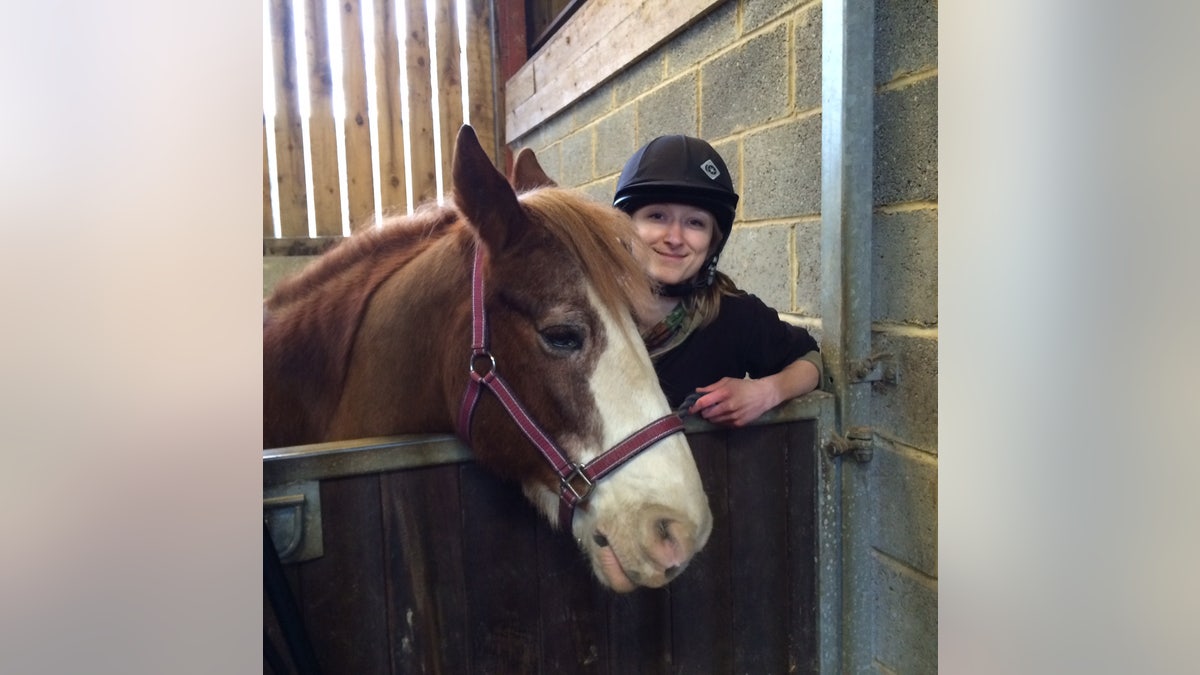
University of Sussex researcher Amy Smith with one of the horses from the study. (University of Sussex)
Anyone who spends time around horses knows they are incredible sensitive and affectionate. But can they tell when you have had a bad day?
A new study says horses can, offering evidence for the first time that they can recognize when someone is happy or angry from looking at our faces. The findings suggests there is plenty more to learn about emotional expression across species.
In their Biology Letters study, researchers from the University of Sussex showed a group of 28 horses photographs of positive and negative human expressions – mostly of faces that looked really happy or very angry. The horses appeared to respond most to the angry faces, giving a sideways glance with the left eye to the photo – considered important because negative events are processed in the right hemisphere of the brain. Their heart rate also increased more quickly and they showed more stress-related behaviors.
“What's really interesting about this research is that it shows that horses have the ability to read emotions across the species barrier,” Amy Smith, a doctoral student at the University of Sussex who co-led the research, said in a statement.
Related: Dogs can detect emotion in human voices, study shows
“We have known for a long time that horses are a socially sophisticated species but this is the first time we have seen that they can distinguish between positive and negative human facial expressions," she said. "The reaction to the angry facial expressions was particularly clear - there was a quicker increase in their heart rate, and the horses moved their heads to look at the angry faces with their left eye."
Karen McComb, who also was a co-lead author of the research, said the findings illustrate that horses may have developed this ability to read emotions over time.
“Horses may have adapted an ancestral ability for reading emotional cues in other horses to respond appropriately to human facial expressions during their co-evolution,” she said. “Alternatively, individual horses may have learned to interpret human expressions during their own lifetime. What's interesting is that accurate assessment of a negative emotion is possible across the species barrier despite the dramatic difference in facial morphology between horses and humans."
Smith and her colleagues said it was interesting that the horses had such a strong reaction to the negative expressions, and little to no response to the positive. They acknowledged that it could be influenced by the fact these were faces the horses had not seen before and that more work was needed to understand the response by age, gender and other indicators.
"This may be because it is particularly important for animals to recognize threats in their environment,” Smith said. “In this context, recognizing angry faces may act as a warning system, allowing horses to anticipate negative human behavior such as rough handling."
Related: Judge rules monkey cannot own selfie photos copyright
Robin Foster, a horse behavior expert at the University of Puget Sound who was not part of the research, said the study was “solid and the methods were simple and elegant—reminiscent of the early studies of the expression and recognition of emotions in human psychology.”
“Horses are socially intelligent animals, but the simplest explanation or why horses in this study reacted to angry human faces (but not happy ones) is associative learning—angry faces are linked to unpleasant or painful experiences,” Foster told FoxNews.com in an email interview, though she acknowledged the study left room for alternative explanations.
"Alternatively the horse may have simply been checking in with the handler, who always stood on the horse's left side - which would also explain why the horse looked to the left more when happy face was presented," she said. "There is good evidence that horses seek out the proximity of familiar people to cope with stress."
The finding is the latest to demonstrate the connections between humans and animals. Dogs, for example, were shown this year to be able to recognize positive and negative emotional states in human. And last year, a study in Science found that the connections between humans and their dogs have the same biochemical basis as the mother-child bond, and it's strengthened by a loving gaze.
Related: Do dogs understand words or emotions?
“Horses, though, like dogs, have been domesticated for use with people, which means generation after generation of intentional selection means that animals with the most favorable human interactions have been retained and perpetuated through breeding, training, and use,” Miami University’s Allen R. McConnell, the president elect of the Midwestern Psychological Association, told FoxNews.com in an email interview.
“Dogs, for example, are adept at reading their owners because of such self-perpetuating processes in self-selection,” he said. “Many dogs can read faces, detect stress through smelling cortisol, etc. The study looks reasonable (e.g., blind video coding, inferential statistics used), so it seems like its conclusions are sensible.”
